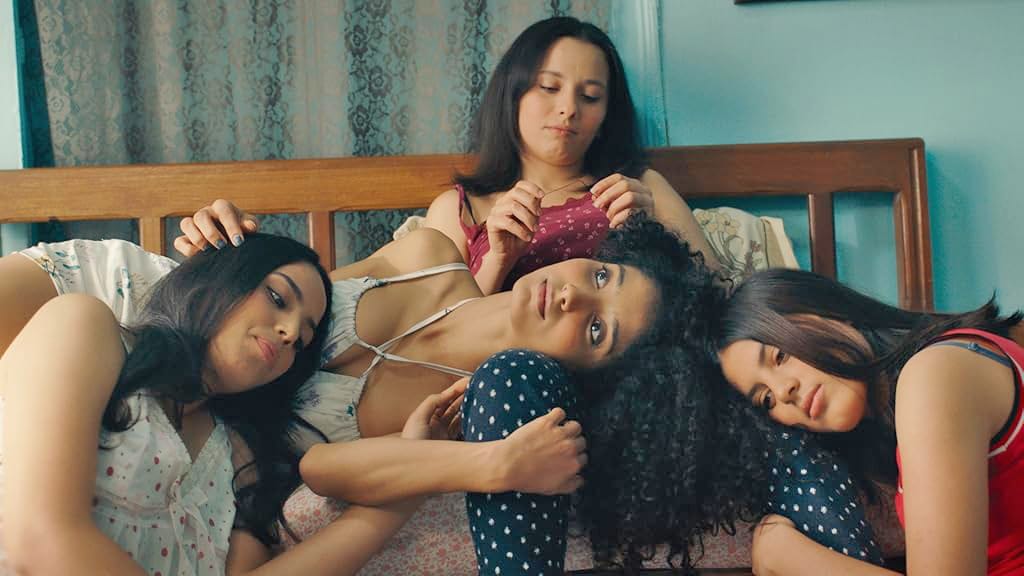- Four Daughters
- 2023
- Documentary
- Not Rated • 1h 47m
Four Daughters is a very different kind of documentary that raises many questions about artifice and filmmaking ethics as it tells the tough story of a broken family. It is at least as interesting in its form and creation as it is in its subject matter. The film tells the real-life story of a Tunisian mother’s struggle to raise four daughters made more difficult by the presence of unhelpful men and a setting in the middle of political turmoil and the conflicts between the Muslim religion and modern secular culture. That story alone is worth seeing in this movie. The exploration of this all-woman family is enlightening for both its similarities to U.S. family life and the almost alienating features of rigid Muslim fundamentalism. Indeed, some of the most interesting parts of the movie are when the Four Daughters are acting like teen-age sisters laying in bed, braiding each other’s hair and talking about boys, sex, and coming of age. Despite their many serious issues, they are, ultimately, normal teenage girls.
But they aren’t all sisters. Four Daughters is a “re-enactment documentary” and the two eldest daughters, Ghofrane and Rahma, are played by professional actresses. (The reason why the real Ghofrane and Rahma are not available is a key part of the story so I don’t want to spoil the movie here.) And, on occasion, so is the mother, Olfa. The result is a unique twist on the “documentary” format.
Some of the differences are intriguing and informative. It is very strange and a bit surreal to see the actress Olfa trying to interact with the daughters while the real Olfa stands leaning against a door jam watching attentively. (And, yes, the camera puts both of them in the same frame!) But then it gets even stranger when the real Olfa starts instructing the actress Olfa, telling her to behave differently or to say something differently to her own daughters. One assumes that the real Mother is trying to inject a more accurate version of what actually happened – but it is also possible that she is doing what anyone would do and paint the picture with a more flattering brush? We don’t know, and, obviously, neither does anyone else.
There are other instances where the “re-enactment” becomes a jarring distraction. Men did exist in the lives of this family, although not exactly happily. In another interesting decision, Ben Hania uses a single male actor to portray all the men in this film. I believe that signifies that the men involved in this family are, essentially, inconsequential and largely interchangeable – it might have been done as a cost-cutting move, but it adds a definite level of messaging. However at about 41 minutes, in a particular re-enactment, the male actor actually requests the filming be stopped, he gets up to have a conference with the director, and he refuses to continue participation in that particular scene. The camera, meanwhile, keeps on rolling capturing all this reticence, but failing to fully explain the actor’s rationale. We know he feels extremely uncomfortable continuing the enactment, but we never understand why. It is an intriguing interruption but we do not get an understanding of what this has to do with the story of the Four Daughters. So, sometimes, Ben Hania’s artifice overwhelms the real story she is trying to tell.
Then there is another, ethical problem with this “re-enactment documentary”. I mentioned that there is an actress who plays the Mother, Olfa, during scenes where the real Olfa is too overwhelmed with emotion to play them herself. And, at times, the real Olfa guides the actress Olfa on what to say and to feel. But sometimes the actress Olfa begins to tell the real Olfa how she has made mistakes in her life and that she isn’t raising the girls properly. I wonder since when does an actress inject herself in the real world telling her character how they should behave or feel? I can understand asking questions to get at the proper emotional mindset, but to actually suggest a different story suggests a bit more than acting – she is almost acting as a parent to the real mother. How would that ever be justified?
And that idea actually injects an important question into the discussion of Four Daughters. Is this a movie or is it a filmed therapy session for a broken family? A documentary is supposed to tell an existing story, not create a brand-new one. And yet, repeatedly, the replacement of the two older sisters ends up having a feedback effect on the entire family dynamic. We see several times that the two real daughters are actually seeing in these two other women another version of their own absent sisters. They laugh, giggle, and do sisterly things – were they acting or did it become their new reality? There is a poignant discussion between the two real daughters towards the end of the movie where you can tell that they have achieved a deeper understanding of their loss and have made substantial progress in dealing with it. Of course, that’s a good thing. But is it right that we witnessed it too?
Four Daughters uses a unique device to explore the inner workings of a family of women in a difficult environment. There is great depth to much of what they are feeling. At times, though, I almost felt like a voyeur and that I was intruding on some of their most sensitive thoughts. As Joan said after watching it, it was a group therapy session caught on film and labeled a documentary. The movie deserves a careful but cautious viewing.



